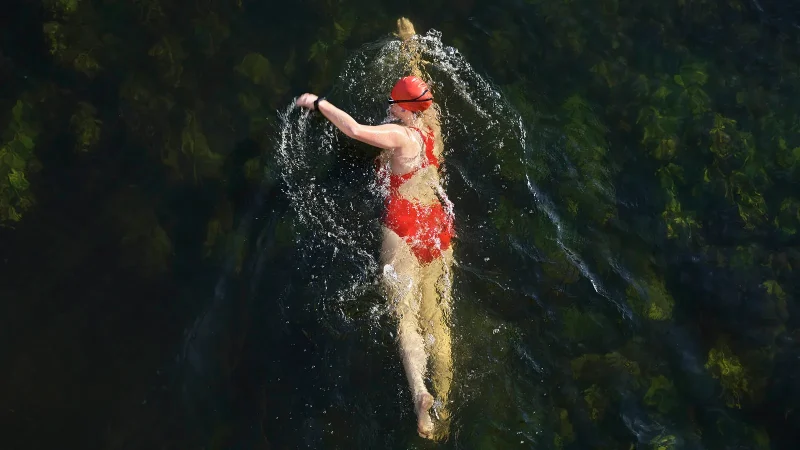- Senior Russian security official threatens nuclear strikes on Kyiv, Paris, London
- EU Trade Chief Maroš Šefčovič Urges MEPs to Support EU-US Trade Deal
- Paul Scholes names Arsenal star he would ‘love to play with’ despite criticism
- Hungary Accuses Ukraine of Lying, Vetoes in Tense Meeting This Week
- Tensions Rise Between France and US Ambassador Charles Kushner After No-Show
- Marcus Rashford makes Barcelona demand after talks over permanent Man Utd transfer
- Russia anticipated Kyiv’s capture within three days in 2022.
- Woman ‘driven to suicide by abusive partner’ left note saying she ‘couldn’t endure any longer’ | News UK
Cold water swimming health trend taking Britain by storm
Quick Summary
- Cold water swimming is also known as wild swimming or outdoor swimming started growing in popularity during the lockdown
- Its popularity has continued to grow since then with many reporting its mental and physical well-being benefits
- More and more research is being done to determine if it’s helpful in treating depression
- The benefits of cold water immersion – whether you’re outdoor swimming or taking an icy dip in a plunge pool in your garden
Analysis
Cold water swimming health trend taking Britain by storm
This summer is set to be seriously hot – and Britain’s newest health trend craze – Cold Water Swimming, is growing in popularity. Cold water swimming, sometimes referred to as outdoor swimming or wild swimming started gaining popularity around the time of the first Covid lockdown. It’s continued to grow over the past few years as more and more discover the physical and mental benefits of an icy cold dip.
There are wild swimming sites all over the UK and they are as varied as they are beautiful. One of the major benefits of wild swimming is its simple, low-cost hobby and minimal gear is needed. Getting involved is easy, a quick google will locate your nearest swimming places in the UK.
There are plenty of open-water swimming groups to join – for both newbies and veterans and there are even organised trips to favourite swimming spots along the UK’s coastline.

The Health Benefits of Cold Water Swimming
Wild swimming is fun, but most importantly is a massive boost for physical and mental wellbeing. A study published in British Medical Journal Case Reports provided the first case report that cold water swimming might be effective in treating depression. The theory behind this is that one form of stress – ie the shock of cold water – adapts the body for another, in this case the stress response associated with depression and anxiety.
There’s still a lot of research needed to support the hypothesis, but many people have been sharing their own experiences of the health benefits of cold water swimming and how it has helped massively improve their mental wellbeing. For those who swear by it, they have taken to organising swimming groups and spreading the message.
It’s important to stress that cold water swimming isn’t a cure for depression and there’s so much more research that needs to be done – but as it grows in popularity, and more diverse groups of people start wild swimming, the results from ongoing research about its mental health benefits will become more comprehensive.
A team at the University of Portsmouth is monitoring cold water swimmers and gathering information about the benefits of cold water swimming for conditions that include depression, anxiety, arthritis, menopausal symptoms, MS and migraines.
More Brits are taking up outdoor swimming for health reasons and are enjoying the low-cost hobby that has a real sense of community. Cold water swimmer Simon Griffiths said: “Swimming is not just something you do. Being a swimmer is something that you are.”
With so many across the country suffering from mental health issues, there’s never been a better time to take an icy outdoor dip.

Cold water immersion – not another health fad
So is cold water immersion just another fad? A dive into the science to find out if its worth it.
Whilst outdoor swimming has become popular, if there isn’t a facility or group near you, many are ordering inflatable plunge pools for an icy dip in the morning – at the lost cost of around £50.
An article from BALANCE says these are the benefits of a cold water dip
COLD WATER HIGH
Immersion into cold water brings us close to the pain barrier and so our bodies release feel-good hormones like dopamine and endorphins, to help us cope. This adrenaline rush also stimulates a rush of the chemical norepinephrine, which helps our brain and body work at optimum efficiency and can positively impact energy and focus hours after taking the frosty plunge.
LONG-TERM MENTAL HEALTH BENEFITS
Regardless if you take part in outdoor cold water swimming or you buy a plunge pool and fill it with cold water – emerging in the icy cold waters can help build up your long-term resilience to stress. If you continually build up your tolerance of low temperatures and fight the body’s natural cortisol-induced reaction to flee the frost, you’ll be better armed against the effects of chronic stress and day-to-day life.
JUMP-START CIRCULATION
Feeling cold will trigger your heart to pump faster, so that blood can better circulate and therefore help retain body temperature, meaning you’ll experience a greater supply of oxygen to the brain and other organs. Forcing the body to work harder, you’ll also burn far more calories than if you were swimming in hotter conditions.
NO MORE COLDS
Taking a cold dip will actually lead to less coughs and colds – providing you get warm quickly afterwards and you’ve had your flu jab if required. This is partly due to a suspected increase in white blood cell production when immersed in cold water, but the exposure to more germs could also play a role in boosting immunity.
How to stay safe when cold water swimming in winter
- If you’re outdoor swimming, never swim alone because open water can be dangerous. Swim where it is safe, and if possible join a local group. Make sure you can enter and exit the water quickly.
- Wear a swimming hat, neoprene gloves, booties, balaclava or a wetsuit.
- Get in quick but don’t jump in – it takes 90-120 seconds for the initial cold water shock to wear off.
- Gently exhale as you enter the water.
- Bring layers, a dry robe and a warm drink and hat after.
- Warm up slowly – don’t have a hot shower and hot water can cool your core and it can be dangerous.
Best place to swim in London
The Hampstead Heath ponds are fantastic – you can expect cold water, muddy banks, and beautiful scenery.
There are ladies and men’s only ponds and a mixed pong. The mixed pond is only open to all in the summer, the Ladies and Men’s Ponds are lifeguarded swimming facilities open to the public every day of the year.
How long should I swim in cold water?
Is it harder to swim in cold water?
Cold water draws heat away from your body 25 times faster than cold air of the same temperature. As your body tries to recover that heat, it forces your heart and respiratory system to work harder, causing you to tire more quickly.
Is swimming in cold water good for weight loss?
Boosts Metabolism
Swimming in cold water causes your body to react in order to produce more heat and maintain your core temperature. One of these adaptations is to increase your metabolism, burning fat in order to keep warm. Therefore, regular cold water swimming may lead to weight loss.
Should you shower after cold water swimming?
How do you feel after cold water swimming?
Like this article?
News Desk
Leave a comment
Subscribe to Updates
Get the latest creative news from FooBar about art, design and business.



